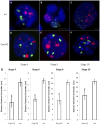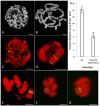Condensin II promotes the formation of chromosome territories by inducing axial compaction of polyploid interphase chromosomes
- PMID: 22956908
- PMCID: PMC3431300
- DOI: 10.1371/journal.pgen.1002873
Condensin II promotes the formation of chromosome territories by inducing axial compaction of polyploid interphase chromosomes
Abstract
The eukaryotic nucleus is both spatially and functionally partitioned. This organization contributes to the maintenance, expression, and transmission of genetic information. Though our ability to probe the physical structure of the genome within the nucleus has improved substantially in recent years, relatively little is known about the factors that regulate its organization or the mechanisms through which specific organizational states are achieved. Here, we show that Drosophila melanogaster Condensin II induces axial compaction of interphase chromosomes, globally disrupts interchromosomal interactions, and promotes the dispersal of peri-centric heterochromatin. These Condensin II activities compartmentalize the nucleus into discrete chromosome territories and indicate commonalities in the mechanisms that regulate the spatial structure of the genome during mitosis and interphase.
Conflict of interest statement
The authors have declared that no competing interests exist.
Figures






References
-
- Cremer T, Cremer M, Dietzel S, Muller S, Solovei I, et al. (2006) Chromosome territories–a functional nuclear landscape. Curr Opin Cell Biol 18: 307–16. - PubMed
-
- Goto B, Okazaki K, Niwa O (2001) Cytoplasmic microtubular system implicated in de novo formation of a Rabl-like orientation of chromosomes in fission yeast. J Cell Sci 114: 2427–35. - PubMed
-
- Pecinka A, Schubert V, Meister A, Kreth G, Klatte M, et al. (2004) Chromosome territory arrangement and homologous pairing in nuclei of Arabidopsis thaliana are predominantly random except for NOR-bearing chromosomes. Chromosoma 113: 258–69. - PubMed
Publication types
MeSH terms
Substances
Grants and funding
LinkOut - more resources
Full Text Sources
Molecular Biology Databases

